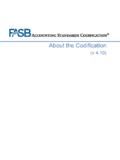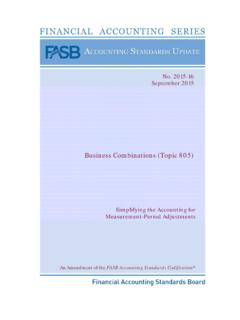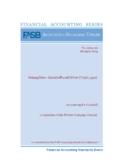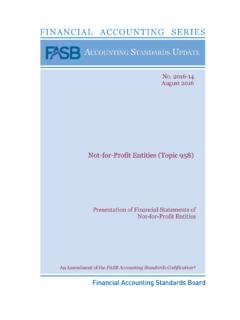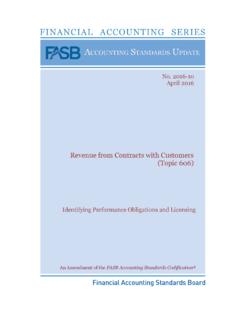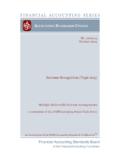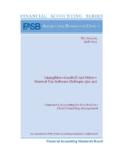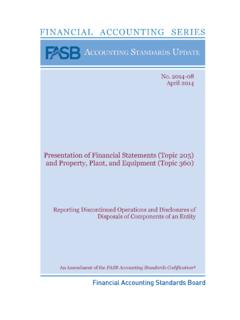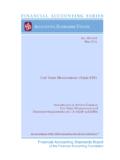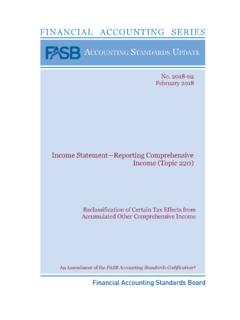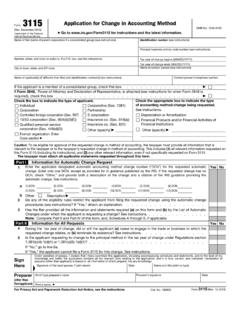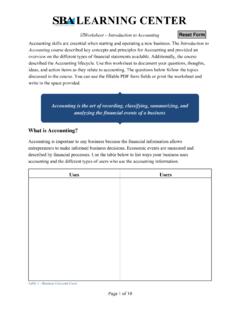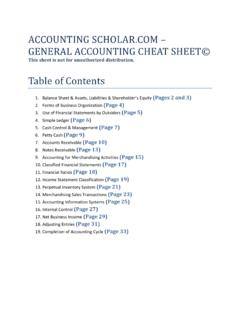Transcription of Consolidation (Topic 810) - FASB Accounting Standards ...
1 Consolidation (Topic 810) No. 2018-17 October 2018 Targeted Improvements to Related Party Guidance for Variable Interest Entities An Amendment of the FASB Accounting Standards Codification The FASB Accounting Standards Codification is the source of authoritative generally accepted Accounting principles (GAAP) recognized by the FASB to be applied by nongovernmental entities. An Accounting Standards Update is not authoritative; rather, it is a document that communicates how the Accounting Standards Codification is being amended. It also provides other information to help a user of GAAP understand how and why GAAP is changing and when the changes will be effective. For additional copies of this Accounting Standards Update and information on applicable prices and discount rates contact: Order Department Financial Accounting Standards Board 401 Merritt 7 PO Box 5116 Norwalk, CT 06856-5116 Please ask for our Product Code No.
2 ASU2018-17. FINANCIAL Accounting SERIES (ISSN 0885-9051) is published monthly with the exception of May and October by the Financial Accounting Foundation, 401 Merritt 7, PO Box 5116, Norwalk, CT 06856-5116. Periodicals postage paid at Norwalk, CT and at additional mailing offices. The full subscription rate is $283 per year. POSTMASTER: Send address changes to Financial Accounting Series, 401 Merritt 7, PO Box 5116, Norwalk, CT 06856-5116. | No. 476 Copyright 2018 by Financial Accounting Foundation. All rights reserved. Content copyrighted by Financial Accounting Foundation may not be reproduced, stored in a retrieval system, or transmitted, in any form or by any means, electronic, mechanical, photocopying, recording, or otherwise, without the prior written permission of the Financial Accounting Foundation. Financial Accounting Foundation claims no copyright in any portion hereof that constitutes a work of the United States Government.
3 An Amendment of the FASB Accounting Standards Codification No. 2018-17 October 2018 Consolidation (Topic 810) Targeted Improvements to Related Party Guidance for Variable Interest Entities Accounting Standards Update Financial Accounting Standards Board Accounting Standards Update 2018-17 Consolidation (Topic 810) Targeted Improvements to Related Party Guidance for Variable Interest Entities October 2018 CONTENTS Page Numbers Summary .. 1 3 Amendments to the FASB Accounting Standards Codification .. 5 25 Background Information and Basis for Conclusions .. 26 34 Amendments to the XBRL Taxonomy .. 35 1 Summary Why Is the FASB Issuing This Accounting Standards Update (Update)? The Board is issuing this Update in response to stakeholders observations that Topic 810, Consolidation , could be improved in the following areas: 1. Applying the variable interest entity (VIE) guidance to private companies under common control 2.
4 Considering indirect interests held through related parties under common control for determining whether fees paid to decision makers and service providers are variable interests. The amendments in this Update improve the Accounting for those areas, thereby improving general purpose financial reporting. Who Is Affected by the Amendments in This Update? The amendments in this Update affect reporting entities that are required to determine whether they should consolidate a legal entity under the guidance within the Variable Interest Entities Subsections of Subtopic 810-10, Consolidation Overall, including private companies that have elected the Accounting alternative for leasing arrangements under common control. The amendments for the private company Accounting alternative apply to all entities except for public business entities and not-for-profit entities as defined in the Master Glossary of the FASB Accounting Standards Codification and employee benefit plans within the scope of Topics 960, 962, and 965 on plan Accounting .
5 What Are the Main Provisions? Private Company Accounting Alternative Under the amendments in this Update, a private company (reporting entity) may elect not to apply VIE guidance to legal entities under common control (including common control leasing arrangements) if both the parent and the legal entity being evaluated for Consolidation are not public business entities. The Accounting alternative provides an Accounting policy election that a private company will apply to all current and future legal entities under common control that meet the criteria for applying this alternative. In other words, the alternative cannot be applied to select common control arrangements that meet the criteria for applying this Accounting alternative. If the alternative is elected, a private 2 company should continue to apply other Consolidation guidance, particularly the voting interest entity guidance, unless another scope exception applies.
6 Under the Accounting alternative, a private company should provide detailed disclosures about its involvement with and exposure to the legal entity under common control. Effectively, the amendments in this Update expand the private company alternative provided by Accounting Standards Update No. 2014-07, Consolidation (Topic 810): Applying Variable Interest Entities Guidance to Common Control Leasing Arrangements, not to apply the VIE guidance to qualifying common control leasing arrangements. Because the private company Accounting alternative in this Update applies to all common control arrangements that meet specific criteria and not just leasing arrangements, the amendments in Update 2014-07 are superseded by the amendments in this Update. Decision-Making Fees Indirect interests held through related parties in common control arrangements should be considered on a proportional basis for determining whether fees paid to decision makers and service providers are variable interests.
7 This is consistent with how indirect interests held through related parties under common control are considered for determining whether a reporting entity must consolidate a VIE. For example, if a decision maker or service provider owns a 20 percent interest in a related party and that related party owns a 40 percent interest in the legal entity being evaluated, the decision maker s or service provider s indirect interest in the VIE held through the related party under common control should be considered the equivalent of an 8 percent direct interest for determining whether its fees are variable interests. How Do the Main Provisions Differ from Current Generally Accepted Accounting Principles (GAAP) and Why Are They an Improvement? Private Company Accounting Alternative Current GAAP provides a private company with an Accounting alternative not to apply VIE guidance to leasing arrangements with entities under common control if certain criteria are met.
8 The amendments in this Update expand the Accounting alternative to include all private company common control arrangements if the common control parent and the legal entity being evaluated for Consolidation are not public business entities. This Accounting alternative should reduce diversity in applying VIE guidance to private companies under common control because it is expected that many private companies will elect the alternative. This Accounting alternative also is expected 3 to improve the relevance of the financial reporting information to users by providing users of private company financial statements with additional disclosures structured in a more consistent manner. Furthermore, the costs and complexity associated with applying VIE guidance to common control arrangements are expected to be reduced for private companies. Therefore, the amendments in this Update meet the overall objective of the Private Company Decision-Making Framework: A Guide for Evaluating Financial Accounting and Reporting for Private Companies, for addressing private company stakeholders needs.
9 Decision-Making Fees The amendments in this Update for determining whether a decision-making fee is a variable interest require reporting entities to consider indirect interests held through related parties under common control on a proportional basis rather than as the equivalent of a direct interest in its entirety (as currently required in GAAP). Therefore, these amendments likely will result in more decision makers not having a variable interest through their decision-making arrangements. These amendments also will create alignment between determining whether a decision-making fee is a variable interest and determining whether a reporting entity within a related party group is the primary beneficiary of a VIE. If fewer decision-making fees are considered variable interests, the focus on determining which party within a related party group under common control may have a controlling financial interest will be shifted to the variable interest holders in the group with more significant economic interests.
10 This will significantly reduce the risk that decision makers with insignificant direct and indirect interests could be deemed the primary beneficiary of a VIE. The amendments in this Update will increase the consistency of the application of the VIE related party guidance for common control arrangements without compromising the utility of a decision maker s financial statements. Specifically, decision makers that are not determined to be the primary beneficiary of a VIE should provide relevant revenue recognition disclosures under Topic 606, Revenue from Contracts with Customers, when decision-making fees are from contracts that are within the scope of Topic 606. When Will the Amendments Be Effective? For entities other than private companies, the amendments in this Update are effective for fiscal years beginning after December 15, 2019, and interim periods within those fiscal years.
